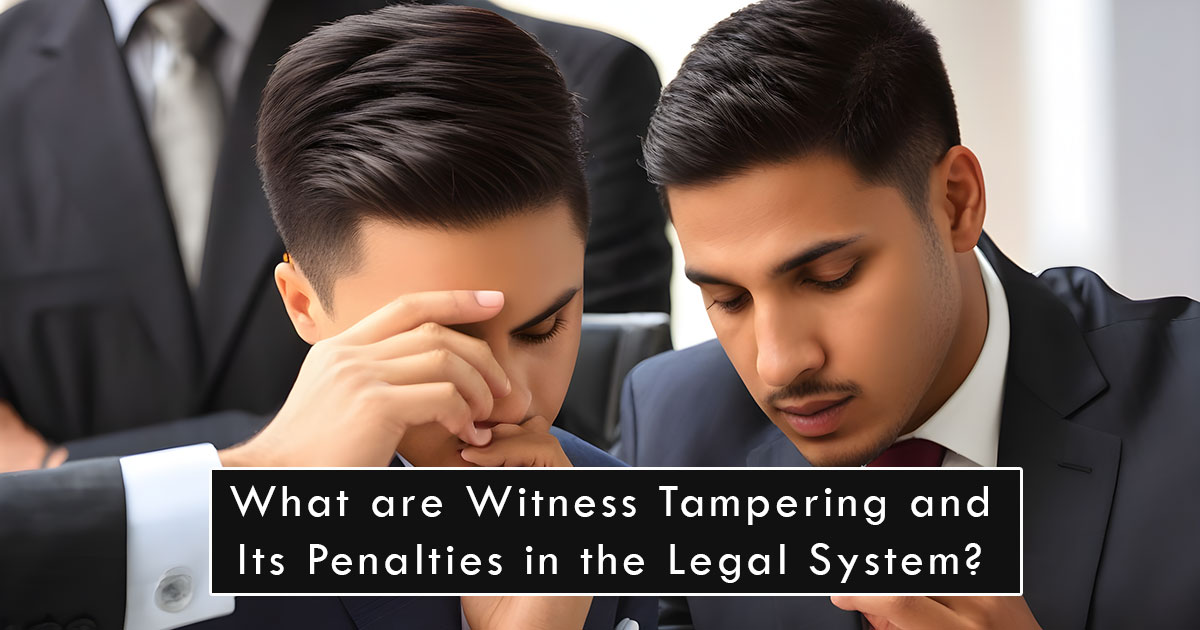Witness tampering is a critical legal issue that can significantly impact the integrity of the judicial process. As such, understanding what constitutes witness tampering and the associated penalties is essential for anyone involved in or studying the legal system. This article provides a comprehensive overview of witness tampering, including its definition, legal implications, and the penalties imposed for such actions.
What is Witness Tampering?
Witness tampering refers to the act of attempting to alter, influence, or prevent the testimony of a witness in any legal proceeding. This can include criminal trials, civil lawsuits, legislative hearings, or any other proceedings where testimony is required.
Key Actions Constituting Witness Tampering
Witness tampering can take various forms, such as:
- Intimidating or threatening a witness: Using threats, harm, or fear tactics to influence a witness’s testimony.
- Bribing a witness: Offering money or other benefits in exchange for false testimony or silence.
- Misleading a witness: Providing false information or persuading a witness to lie or change their testimony.
- Interfering with a witness’s statement: Physically preventing a witness from testifying or altering their statement.
Legal Framework Surrounding Witness Tampering
Witness tampering is a federal offense in the United States, governed by specific laws and regulations. It is also recognized as a serious crime in many other jurisdictions worldwide.
Federal Laws in the United States
Under U.S. federal law, particularly Title 18 of the U.S. Code, Sections 1512 and 1513, witness tampering is explicitly prohibited and comes with severe penalties.
State Laws
In addition to federal laws, each state has its own set of laws regarding witness tampering. These laws can vary but generally align with federal regulations in terms of defining and penalizing the act.
Penalties for Witness Tampering
The penalties for witness tampering are severe, reflecting the seriousness of the offense and its potential to undermine the legal process.
Federal Penalties
At the federal level, penalties can include:
- Imprisonment: Individuals found guilty of witness tampering can face significant prison time, sometimes up to 20 years or more, depending on the severity of the offense.
- Fines: Substantial fines may be imposed either in addition to or instead of imprisonment.
- Probation or Parole: In some cases, individuals may be sentenced to probation or parole, along with other conditions set by the court.
State-Level Penalties
State penalties for witness tampering also include imprisonment, fines, and probation, with the severity varying based on the specific state laws and the circumstances of the case.
Penalties in California
In California, under Penal Code 136.1, witness tampering or intimidating a witness is considered a serious offense. The law specifies that anyone who knowingly and maliciously prevents or dissuades, or attempts to prevent or dissuade, a witness or victim from attending or testifying at any legal proceeding, reporting a crime, or aiding in the arrest or prosecution process can be charged with this crime.
The penalties for violating Penal Code 136.1 depend on whether the offense is charged as a misdemeanor or a felony:
- Misdemeanor Charges: If charged as a misdemeanor, the offense is punishable by up to one year in county jail and/or a maximum fine of $1,000.
- Felony Charges: If charged as a felony, the penalties include imprisonment in the state prison for up to four years and/or a maximum fine of $10,000. A felony charge is more likely if the act involved force or threats of violence, was part of a conspiracy, was committed by someone with a prior conviction for witness tampering, or was done for pecuniary gain.
It’s important to note that even an attempt to intimidate a witness is sufficient for a charge under this statute, regardless of whether the intimidation was successful or if the witness was actually intimidated.
Additionally, there are defenses available against charges of witness tampering, such as proving there was no knowledge or malice, the person was not actually a witness or victim, or the accusation is false.
This information is critical for understanding the legal implications of witness tampering in California and the potential consequences that may follow a conviction. For detailed legal advice and representation, it’s advisable to consult a qualified attorney, especially if you are involved in such a case.
The Impact of Witness Tampering
Witness tampering not only affects the individuals involved but also poses a significant threat to the legal system’s integrity. It can lead to wrongful convictions or acquittals and erodes public trust in the judicial process.
Conclusion
Witness tampering is a serious offense with severe consequences. It is vital for the maintenance of justice that witnesses in legal proceedings are able to provide their testimony without fear of coercion, threat, or influence. Understanding the gravity of witness tampering and the penalties associated with it is crucial for legal professionals, students, and the public to ensure the upholding of justice and the smooth functioning of the legal system.









Leave a Reply